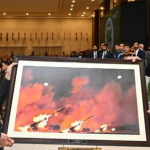In a significant development amidst rising Indo-Pak tensions, Pakistan’s Prime Minister Shehbaz Sharif has expressed his government’s willingness to resume dialogue with India to resolve bilateral disputes, including the contentious Indus Waters Treaty. Speaking to reporters in Islamabad, Sharif stated, “We want to resolve all disputes,” indicating a shift in tone following months of diplomatic strain.
The statement comes weeks after India suspended the Indus Waters Treaty in April 2025 in the wake of a gruesome terror attack in Pahalgam, Jammu & Kashmir, which claimed the lives of 25 Indian tourists and one Nepalese citizen. India blamed the cross-border infiltration of terrorists backed by Pakistani groups for the massacre, prompting External Affairs Minister Dr. S. Jaishankar to announce the treaty’s suspension until Pakistan takes “verifiable and irreversible” steps to dismantle terror infrastructure operating from its soil.
The Indus Waters Treaty, brokered by the World Bank in 1960, has long been regarded as a rare example of sustained cooperation between the two neighbours. However, New Delhi has increasingly questioned its relevance in the face of Pakistan’s continued use of terrorism as state policy. Jaishankar reiterated on May 15 that the treaty would remain “in abeyance” unless Pakistan acts against terrorism and vacates Pakistan-occupied Kashmir (PoK), which India asserts as its integral part.
Sharif’s remarks come shortly after Pakistan observed “Yaum-e-Tashakur” on May 16 to celebrate its claimed success in Operation Bunyan Marsoos—an event Indian analysts view as psychological warfare amid military setbacks during India’s successful Operation Sindoor. While Sharif’s call for talks appears conciliatory, Indian officials remain cautious, citing a long history of unkept promises and proxy attacks by Pakistan-based groups.
India’s strategic posture remains clear: talks and terror cannot go together. Until Islamabad demonstrates credible action against terrorist networks such as Lashkar-e-Taiba and Jaish-e-Mohammed, and addresses India’s concerns on PoK, New Delhi is unlikely to reciprocate Sharif’s outreach.
With the region already on edge following recent military escalations, the coming weeks will test whether Pakistan’s latest overture marks a genuine policy shift or a tactical move under international pressure. For now, India continues to uphold national security as the foremost priority while keeping diplomatic channels under strict conditionality.













